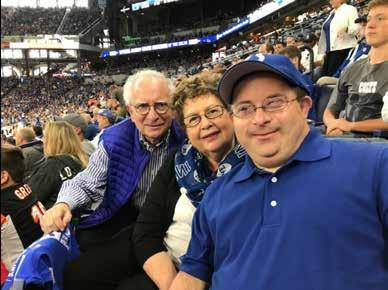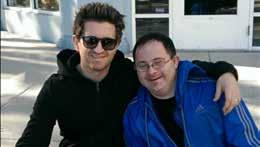
6 minute read
About Tom O’Neill
By Angela Arlington
On August 31, 1978, Tom O’Neill’s son, Joshua, was born. He was born three weeks late and in critical condition. Because of a number of medical complications, the decision was made to immediately move Joshua from Lake Forest Hospital in Lake Forest, IL, to the neonatology unit at Evanston Hospital. During his 37-day stay in the neonate unit, Joshua experienced surgical procedures twice; one of them being major surgery. Besides the other medical complications, on the day of his birth, there was also a tentative diagnosis of Down syndrome; that was confirmed a few days later. Joshua was also born with Hirschprung’s Disease, a disease of the lower intestine. It required immediate surgery following his birth and another surgery 10 months later.
Advertisement

Prior to their experiences with the neonatology unit at Evanston, Tom indicated that he had never heard the words neonatology or neonatologist. It was the neonatologist at Evanston Hospital, Dr. Tom Gardner, who gave Tom and his wife, Rita, the Down syndrome diagnosis. Dr. Gardner gave this information, as well as the other medical information, in an affirming and supportive manner. He was also the person who, according to Tom, “held their hands” and provided the supports that were so important and so helpful for them during Joshua’s first days of life.

A year after Joshua was born, the O’Neills moved to Fort Wayne, IN. After one year of involvement and their growing dissatisfaction with the local pre-school that Joshua was attending, Tom and Rita, along with two other families, banded together and started a pre-school that they felt would better address the physical and cognitive needs of their children; needs that were not being met by the current program. They applied to the IRS and were granted 501(C)3 status. With that in hand, the three families went to the Fort Wayne community to raise funds. The funds raised, along with the tuition paid by the three families, kept the program financially afloat. They did not apply for and did not receive any government or United Way funds. While that made for some financial challenges, it also gave them the freedom to operate the program without unnecessary regulations. Tom said that he and Rita, as well as the other families, all felt that if they did not ensure the service their kids needed, “who was going to?” After the first year, an infant stimulation program was added with three newborns.
As unorthodox as it was, the three families came to serve as both the administrators of the program, as well as the Board of Directors. The program they started began in rent-free space provided by the University of St. Francis. They hired Sarah Litch, a highly-respected and gifted early childhood educator as the lead teacher, and contracted for services with a speech therapist. The program was known as the Learning and Development Center, the LDC. When Joshua left the program in 1986, there were 37 children with various special needs enrolled. In transitioning from LDC, Joshua moved to the Southwest Allen County School Corporation and was placed in his local neighborhood public school. In 1998 Joshua graduated from Homestead High School with a regular high school diploma. Joshua was the first youngster with Down syndrome to go through all 12 grades and graduate with his class. During the 12 years that Joshua attended Southwest Allen County Schools, Tom served on the Superintendents’ Advisory Council.

Upon graduating from Homestead High School, Joshua went to New Haven, Connecticut to attend Chapel Haven, a post-secondary program for individuals with various learning challenges and cognitive disabilities. Joshua graduated from the residential program in 2001 and wanted to remain in the New Haven community as he had established relationships. He has lived in his condo for 20 years, with a roommate and supports.
Over the years, the LDC was logistically integrated into local infant and pre-school programs operated by the Methodist and Catholic Churches. The philosophy was to provide the specialized services needed, while at the same time mainstreaming the children into regular early childhood and preschool programs. This provided a normalizing experience for all of the children; both those with and without special needs. LDC continued to provide services for 25 years, until 2005. Tom and his wife, Rita, found their involvement with the LDC to be both challenging and at the same time rewarding. Tom used the word “empowering” to describe the benefit for them because of their involvement with the LDC. By 1981 Tom was active with the Down syndrome community at the local, state, and national levels. That involvement continued for the next 28 years, until 2009. Besides his involvement with various local and statewide initiatives, Tom served on the Boards of Directors of both the National Down Syndrome Congress, based in Atlanta, and the National Down Syndrome Society, based in New York City. Other efforts with which Tom was involved included bringing Down syndrome conferences to Indiana; two of these conferences were held in Indianapolis and one in Fort Wayne. Tom was part of the planning group that established the Down Syndrome Association of Northeast Indiana. While at both the local and national levels, Tom was always involved with fundraising. He enjoyed the different challenges that each required in order to educate the public while successfully raising money. Tom was involved over the years in advocacy, both in Indianapolis and Washington, D.C. The international Down syndrome movement started in the early 1980s. Tom was involved with that and participated in the structuring and programming that brought Down syndrome to first and third world countries.

Time with his family was always critically important to Tom. Tom’s and Rita’s son, Noah, was born in 1981. Tom especially appreciated the one-on-one time he had with each son. He focused on making time with his sons as they grew up. Each year he would take one of his sons on a few days of vacation to do what they wanted. Those trips were usually sports-related. Both Josh and Noah got his individual attention and time to do what they wanted. Tom says that while that special time was important to both Joshua and Noah, he said that it was probably equally if not more important to him. He especially treasures the memories of those trips now as his sons are adults, “You only get to go around once in life.”
Realizing the importance of education and post-secondary experiences for every child, Tom and his family established the O’Neill Tabani Enrichment Fund in 2004. It is administered through the office of the National Down Syndrome Society in New York City. Any young adult with Down syndrome, 18 and over, is eligible to apply for support. To date, 94 young people have received funding. Tom and Rita remain involved with the Fund, while the leadership of it has moved from them to their son, Noah, his wife, Ashley, and Joshua.
Today as Tom reflects back on over 40 years of involvement with Down syndrome and the world of disability services and rights, he recognizes that there is much work that remains to be done. Tom also recognizes that it is evolving and continues to move in a positive direction. Tom is especially pleased to see the level of involvement and leadership from the self-advocates, as well as the ever-growing involvement of dads. Today the DADS movement, Dads Appreciating Down Syndrome, is strong and as Tom stated, “The involvement of dads in the lives of their children, both those with Down syndrome and those without, makes for stronger and healthier individuals, healthier couple relationships, healthier families, and a stronger and healthier society.”

If you would like to be a part of this Pioneer Parent section or to nominate someone else to be in an upcoming issue of Special Needs Living, Email us at SpecialNeedsLivingIndy@n2pub.com










